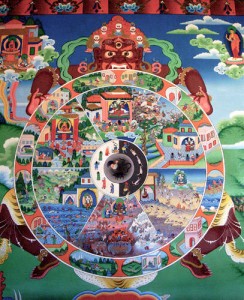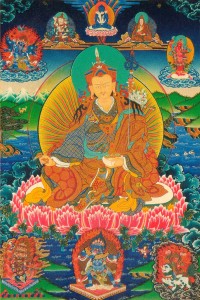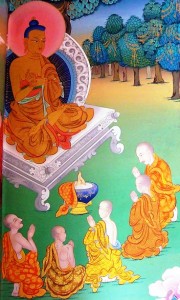
The following is an excerpt from a teaching by Jetsunma Ahkon Lhamo called “Inescapable Cause and Effect”
Each of us has really difficult karma, tremendous obstacles, and each of us also has the karma for tremendous bliss. We cannot ripen them all in one lifetime. However, when one leaves this lifetime it is up for grabs what ripens in the next incarnation; and there are many factors that are a catalyst for the ripening in the next incarnation. Some of them are the condition under which you die; the thoughts that are in your mind as you die; the mind state that you have as you die; the ability to be able to negotiate the consciousness after the death state; the ability to remain aware, to not faint, to remain aware and with it during the after-death state, which almost no one has. The desire that you have experienced in this lifetime will act as a catalyst to ripen the events for the next lifetime. Everything that you have done in this lifetime will act as a catalyst to ripen the events for the next lifetime and in all future lifetimes. So according to the Buddha’s teachings, it is not necessarily a linear progression in that it is not possible to account for all the ripening karma in the course of one lifetime, and even in the course of the next lifetime and the next lifetime.
So you can actually be reborn under any circumstances. This is one of the main faults of cyclic existence. Even though we have a circumstance here that seems relatively bearable in that we are not very hungry, we are not very ugly, we are not very sick, and we are okay, still we will experience death in order to take rebirth at another time. Not knowing what the conditions of that rebirth will be can be considered an unbearable circumstance. I want to know where I am going. I find it unbearable to think that I wouldn’t know where my next incarnation would be: To not have the option to prepare for the next incarnation; to not be able to know that I would not be reborn in some other life form that is offensive to me or that is ugly to me or is not at all pleasing to me; or to be reborn as a human being where I would experience intense suffering. These things I find not bearable. So if we understand that cyclic existence is structured in that way, or seems to occur in that way, we might find that even the idea that we might take rebirth becomes something that we can use as a motivation to practice.
The thing about cyclic existence is that it is unpredictable. You must know this by now; and this should give you a clue as to how we hide these things from ourselves. But I know that you know this by now because all of you have had experiences, I have certainly, where, , things will be going along just fine in a way that looks like everything is under control and it looks as though you have what you need. You have the relationships that you need, the money that you need; you are doing okay. It looks like things are progressing nicely. And then suddenly something will hit you right out of the blue, whether it is a terrible mood or whether it is a circumstance or whether it is a death, somebody that you know, or a loss of some kind, some experience that will seem as though it came from nowhere. And if only this hadn’t happened everything would be just fine. We have at least a million of, ‘Oh, if this only hadn’t happened,’ in our lives and we don’t see where they come from. And so cyclic existence is extremely unpredictable and there are always things that can ripen in an instant way and bring about change that is unbearable to us.
Another fault of cyclic existence is that there is nothing in cyclic existence that brings about the end of cyclic existence. That is hard to understand. And if you examine it yourself, you will find that you think that if you just keep playing along with it eventually it will work itself out. We think that if we just kind of live through our lives it will just sort of guide its way through or naturally flow in such a way that we will reach a threshold of wisdom, and suddenly all of our problems will be solved. This is Western thought. This is what we are brought up to believe. We are taught, however, by the Buddha, who has experienced both cyclic existence and also the awakening called supreme enlightenment, that this is not true. There is nothing inherent in cyclic existence that will bring about its end. Cyclic existence is simply that, cyclic.
In cyclic existence there are the root causes such as the belief in self nature as being inherently real and the clinging to ego that bring the perception of self and other and the constant compulsion to reinforce the perception of self and other, that bring about desire. And desire is the root cause of all suffering. But from those root causes are begun the next level of root causes which are hatred, greed and ignorance. And hatred, greed and ignorance, we constantly experience to some degree or another. We constantly need to reinforce ourselves by putting down someone else or experiencing a negative feeling toward someone else. We need to judge something in some way in order to understand our own nature. We constantly have the experience of not realizing the profound nature of enlightenment or the nature of primordial wisdom, and that we call ignorance. We constantly experience greed and we constantly need to define ourselves by what we have. We constantly need that and from these points come the other forms that continue cause and effect relationships, continually experiencing one cause begetting an effect, begetting another cause and begetting an effect. We experience that constantly and consistently. According to the Buddha’s teaching, whenever we experience a moment of hatred or whenever we experience a moment of anger…. Anger. Who among you has not experienced anger? How many times a day? According to the Buddha’s teaching, even when we experience even a moment of anger it has within it the potential for worlds of karmic interaction.
One cause continually creates, always and always. There is never any exception. Cause will create effect. There is no cause that does not create effect; and effect will actually act as another cause. If someone, for instance, strikes you, that must have a cause. You may not know what the cause for that is, but it didn’t just happen. It has a cause. And if you get angry when that person strikes you, then that continues and that is an effect from the striking, but it is also another cause and it will begin new circumstances. This relationship of cause and effect constantly perpetuating itself is called interdependent origination. It is such an interdependence it is almost like the weaving of a fabric; and cyclic existence is actually made of this fabric that is woven together, a constant cause and effect. There is no circumstance within cyclic existence that brings about the end of cyclic existence.
The exception to that—it isn’t really an exception—is that within cyclic existence one can begin to strive to purify the mind. One can begin to strive to practice in such a way that one’s own pure nature is realized. One can begin, very importantly, to accomplish compassionate activity to purify the mind through kindness, to begin to experience loving kindness and compassion. And through that, cause and effect will happen so that one can meet a pure path; and a pure path is the means by which one can exit cyclic existence. There is nothing within cyclic existence itself that will naturally begin the end of cyclic existence, that will actually bring about the end of cyclic existence. But in fact one can actually begin to purify the mind in such a way that you can meet with a pure path. And the pure path is actually considered an emanation, the miraculous intention of the Buddha, or the mind of enlightenment. It intersects with cyclic existence in such a way that one can practice this pure path, and having practiced this pure path can thereby exit cyclic existence and accomplish enlightenment.
Copyright © Jetsunma Ahkon Norbu Lhamo All rights reserved




